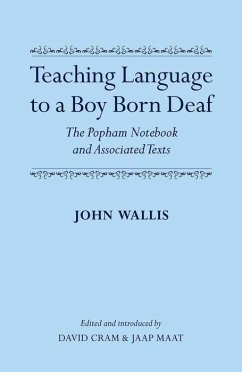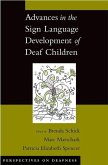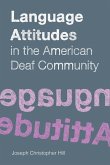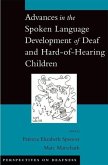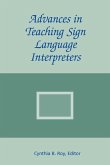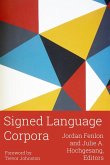John WallisThe Popham Notebook and Associated Texts
Teaching Language to a Boy Born Deaf
The Popham Notebook and Associated Texts
Herausgeber: Cram, David; Maat, Jaap
John WallisThe Popham Notebook and Associated Texts
Teaching Language to a Boy Born Deaf
The Popham Notebook and Associated Texts
Herausgeber: Cram, David; Maat, Jaap
- Gebundenes Buch
- Merkliste
- Auf die Merkliste
- Bewerten Bewerten
- Teilen
- Produkt teilen
- Produkterinnerung
- Produkterinnerung
An edition of the recently discovered notebook used in the seventeenth-century by John Wallis to teach language to the 'deaf mute' Alexander Popham, who could not inherit unless he could speak - one of the most famous cases in the history of deaf education. David Cram and Jaap Maat place the work in its personal, social, and scientific contexts.
Andere Kunden interessierten sich auch für
![Advances in the Sign Language Development of Deaf Children Advances in the Sign Language Development of Deaf Children]() Brenda Schick / Marc Marschark / Patricia Elizabeth Spencer (eds.)Advances in the Sign Language Development of Deaf Children149,99 €
Brenda Schick / Marc Marschark / Patricia Elizabeth Spencer (eds.)Advances in the Sign Language Development of Deaf Children149,99 €![Language Attitudes in the American Deaf Community Language Attitudes in the American Deaf Community]() Joseph Christopher HillLanguage Attitudes in the American Deaf Community84,99 €
Joseph Christopher HillLanguage Attitudes in the American Deaf Community84,99 €![Advances in the Spoken-Language Development of Deaf and Hard-Of-Hearing Children Advances in the Spoken-Language Development of Deaf and Hard-Of-Hearing Children]() Patricia Elizabeth Spencer / Marc Marschark (eds.)Advances in the Spoken-Language Development of Deaf and Hard-Of-Hearing Children166,99 €
Patricia Elizabeth Spencer / Marc Marschark (eds.)Advances in the Spoken-Language Development of Deaf and Hard-Of-Hearing Children166,99 €![Deaf Interpreters at Work Deaf Interpreters at Work]() Deaf Interpreters at Work74,99 €
Deaf Interpreters at Work74,99 €![Teaching Written Portuguese to the Deaf: Teaching Written Portuguese to the Deaf:]() Lucimar BizioTeaching Written Portuguese to the Deaf:23,99 €
Lucimar BizioTeaching Written Portuguese to the Deaf:23,99 €![Advances in Teaching Sign Language Interpreters: Volume 2 Advances in Teaching Sign Language Interpreters: Volume 2]() Advances in Teaching Sign Language Interpreters: Volume 267,99 €
Advances in Teaching Sign Language Interpreters: Volume 267,99 €![Signed Language Corpora: Volume 25 Signed Language Corpora: Volume 25]() Signed Language Corpora: Volume 2584,99 €
Signed Language Corpora: Volume 2584,99 €-
-
-
An edition of the recently discovered notebook used in the seventeenth-century by John Wallis to teach language to the 'deaf mute' Alexander Popham, who could not inherit unless he could speak - one of the most famous cases in the history of deaf education. David Cram and Jaap Maat place the work in its personal, social, and scientific contexts.
Hinweis: Dieser Artikel kann nur an eine deutsche Lieferadresse ausgeliefert werden.
Hinweis: Dieser Artikel kann nur an eine deutsche Lieferadresse ausgeliefert werden.
Produktdetails
- Produktdetails
- Verlag: Hurst & Co.
- Seitenzahl: 344
- Erscheinungstermin: 28. Februar 2018
- Englisch
- Abmessung: 236mm x 157mm x 36mm
- Gewicht: 680g
- ISBN-13: 9780199677085
- ISBN-10: 0199677085
- Artikelnr.: 48024010
- Herstellerkennzeichnung
- Libri GmbH
- Europaallee 1
- 36244 Bad Hersfeld
- gpsr@libri.de
- Verlag: Hurst & Co.
- Seitenzahl: 344
- Erscheinungstermin: 28. Februar 2018
- Englisch
- Abmessung: 236mm x 157mm x 36mm
- Gewicht: 680g
- ISBN-13: 9780199677085
- ISBN-10: 0199677085
- Artikelnr.: 48024010
- Herstellerkennzeichnung
- Libri GmbH
- Europaallee 1
- 36244 Bad Hersfeld
- gpsr@libri.de
John Wallis (1618-1703) was a founder member of the Royal Society, a mathematician and pioneer of calculus, and a linguist whose work included the groundbreaking tract on phonetics, De Loquela (1653). David Cram is an Emeritus Fellow of Jesus College, formerly Senior Research Fellow and Lecturer in Linguistics. By background and training he is a theoretical linguist, but the bulk of his research has concerned the history of ideas about language in the seventeenth century, on topics ranging from philosophical languages to linguistic eschatology. He is co-editor, with Jaap Maat, of George Dalgarno on Universal Language: The Art of Signs (1661), The Deaf and Dumb Man's Tutor (1680), and the Unpublished Papers (OUP, 2001). Jaap Maat is Lecturer in Philosophy at the University of Amsterdam, and is a member of the Institute for Logic, Language and Computation (ILLC). He has published widely on the history of linguistic ideas and the history of logic. He is a founding editor of History of Humanities and co-editor, with David Cram, of George Dalgarno on Universal Language: The Art of Signs (1661), The Deaf and Dumb Man's Tutor (1680), and the Unpublished Papers (OUP, 2001).
* INTRODUCTION
* i: Deafness in philosophical, medical, legal and religious
perspectives
* ii: Teaching language to the deaf before the 1650s
* iii: Literature on teaching language to the deaf in
seventeenth-century Britain
* iv: The education of Alexander Popham
* v: Aftermath and retrospect
* PART I: THE POPHAM NOTEBOOK
* 1: Transcription of text, with textual footnotes
* PART II: THE EDUCATION OF ALEXANDER POPHAM
* 2: John Wallis (1661) First letter to Boyle on teaching language to
the deaf
* 3: William Holder (1669) An Appendix Concerning Persons Deaf and Dumb
* 4: John Wallis (1670 [1662]) Second letter to Boyle on teaching
language to the deaf
* 5: William Holder (1678) A Supplement to the Philosophical
Transactions of July 1670
* 6: John Wallis (1678) A Defence of the Royal Society; In answer to
the cavils of Dr. William Holder
* PART III: AFTERMATH AND LEGACY
* 7: John Wallis to Thomas Beverley (1698) On teaching language to the
deaf
* 8: John Wallis and Johann Conrad Amman (1700) An exchange of letters
on the method of teaching the deaf
* 9: Henry Baker (1723) A Short Essay on Speech
* Bibliography
* Index
* i: Deafness in philosophical, medical, legal and religious
perspectives
* ii: Teaching language to the deaf before the 1650s
* iii: Literature on teaching language to the deaf in
seventeenth-century Britain
* iv: The education of Alexander Popham
* v: Aftermath and retrospect
* PART I: THE POPHAM NOTEBOOK
* 1: Transcription of text, with textual footnotes
* PART II: THE EDUCATION OF ALEXANDER POPHAM
* 2: John Wallis (1661) First letter to Boyle on teaching language to
the deaf
* 3: William Holder (1669) An Appendix Concerning Persons Deaf and Dumb
* 4: John Wallis (1670 [1662]) Second letter to Boyle on teaching
language to the deaf
* 5: William Holder (1678) A Supplement to the Philosophical
Transactions of July 1670
* 6: John Wallis (1678) A Defence of the Royal Society; In answer to
the cavils of Dr. William Holder
* PART III: AFTERMATH AND LEGACY
* 7: John Wallis to Thomas Beverley (1698) On teaching language to the
deaf
* 8: John Wallis and Johann Conrad Amman (1700) An exchange of letters
on the method of teaching the deaf
* 9: Henry Baker (1723) A Short Essay on Speech
* Bibliography
* Index
* INTRODUCTION
* i: Deafness in philosophical, medical, legal and religious
perspectives
* ii: Teaching language to the deaf before the 1650s
* iii: Literature on teaching language to the deaf in
seventeenth-century Britain
* iv: The education of Alexander Popham
* v: Aftermath and retrospect
* PART I: THE POPHAM NOTEBOOK
* 1: Transcription of text, with textual footnotes
* PART II: THE EDUCATION OF ALEXANDER POPHAM
* 2: John Wallis (1661) First letter to Boyle on teaching language to
the deaf
* 3: William Holder (1669) An Appendix Concerning Persons Deaf and Dumb
* 4: John Wallis (1670 [1662]) Second letter to Boyle on teaching
language to the deaf
* 5: William Holder (1678) A Supplement to the Philosophical
Transactions of July 1670
* 6: John Wallis (1678) A Defence of the Royal Society; In answer to
the cavils of Dr. William Holder
* PART III: AFTERMATH AND LEGACY
* 7: John Wallis to Thomas Beverley (1698) On teaching language to the
deaf
* 8: John Wallis and Johann Conrad Amman (1700) An exchange of letters
on the method of teaching the deaf
* 9: Henry Baker (1723) A Short Essay on Speech
* Bibliography
* Index
* i: Deafness in philosophical, medical, legal and religious
perspectives
* ii: Teaching language to the deaf before the 1650s
* iii: Literature on teaching language to the deaf in
seventeenth-century Britain
* iv: The education of Alexander Popham
* v: Aftermath and retrospect
* PART I: THE POPHAM NOTEBOOK
* 1: Transcription of text, with textual footnotes
* PART II: THE EDUCATION OF ALEXANDER POPHAM
* 2: John Wallis (1661) First letter to Boyle on teaching language to
the deaf
* 3: William Holder (1669) An Appendix Concerning Persons Deaf and Dumb
* 4: John Wallis (1670 [1662]) Second letter to Boyle on teaching
language to the deaf
* 5: William Holder (1678) A Supplement to the Philosophical
Transactions of July 1670
* 6: John Wallis (1678) A Defence of the Royal Society; In answer to
the cavils of Dr. William Holder
* PART III: AFTERMATH AND LEGACY
* 7: John Wallis to Thomas Beverley (1698) On teaching language to the
deaf
* 8: John Wallis and Johann Conrad Amman (1700) An exchange of letters
on the method of teaching the deaf
* 9: Henry Baker (1723) A Short Essay on Speech
* Bibliography
* Index

